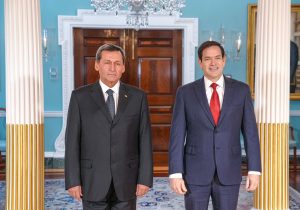On August 20, U.S. Secretary of State Marco Rubio met with Turkmenistan’s Foreign Minister Rashid Meredov in the context of the 11th round of annual bilateral consultations (ABCs), a regular opportunity for the two sides to meet. ABCs have been held in most years since 2009. Unlike in the past two years, however, there appears to be no joint statement regarding the recent meeting and relatively vague details about the discussions.
A statement attributable to Principal Deputy Spokesperson Tommy Pigott after the meetings outlined the discussions – which were led by Meredov and Deputy Assistant Secretary for South and Central Asian Affairs John Mark Pommershein – in broad terms. The two “underscored their commitment to advancing U.S.-Turkmenistan relations, including through security cooperation, increased economic and investment opportunities, the advancement of religious freedom, and deepening engagement through the C5+1 diplomatic platform.”
Unmentioned is any discussion of the current partial travel ban targeting Turkmenistan, among other countries, which was announced in early June. In a rare public comment on June 10, the Turkmen Ministry of Foreign Affairs called the partial ban – which applies to an array of immigrant visas and tourist, student, and exchange visitor visas – a “hasty step.”
Presumably, the topic was discussed, but both sides have said nothing officially about it.
Per the original presidential proclamation announcing the travel ban, within 90 days (and then every 180 days thereafter) reports are due from a plethora of top officials, routed thorough Assistant to the President for Homeland Security Stephen Miller, regarding recommendations adjusting the policy. The 90 day mark is September 2.
The U.S. statement following the consultations mentioned discussions on supporting “bilateral business deals with key U.S. companies as well as expanded investment opportunities in Turkmenistan.” The Turkmen statement echoed that focus, noting that “issues of implementing bilateral projects with leading American companies were also considered and prospects for expanding their investment opportunities in Turkmenistan were discussed.”
U.S. goods and services trade with Turkmenistan is the second lowest of all five Central Asian states at an estimated $218.5 million in 2024 (Tajikistan comes in last with a 2024 trade volume in goods and services sliding down to $172.4 million; Kazakhstan is the regional leader with an estimated $5.5 billion in trade with the U.S. in 2024.)
One topic that made an appearance in the U.S. statement but is absent from the Turkmen version is that of religious freedom. “The delegations also shared views on religious freedom,” the U.S. statement reads. Among those views: Since 2014, the U.S. State Department, working off advice from the Commission on International Religious Freedom (USCIRF), has designated Ashgabat a “country of particular concern.” Although the designation has never come with any related sanctions, owning to a presidential waiver made on “national security” grounds, USCIRF once again in March recommended Turkmenistan be designated and sanctioned. The State Department has not yet acted on USCIRF’s recommendations.
Making an appearance in both statements were comments related deepening engagement through the C5+1 format. Since 2015, the foreign ministers of the five Central Asian states have met with the U.S. secretary of state annually. In 2023 on the sidelines of the U.N. General Assembly in September, then-U.S. President Joe Biden hosted the first C5+1 Presidential Summit. That meeting came several months after Chinese President Xi Jinping hosted a leaders’ level summit of his own in Xi’an with the Central Asian presidents. Kazakhstan hosted the 2nd Central Asia-China summit earlier this year.
Presumably, a C5+1 meeting – at least between the foreign ministers – is in the works, likely to take place amid the upcoming UNGA session in September as previous such meetings have.
Curiously, neither the U.S. nor the Turkmen statement mentions the word “energy,” though Turkmenistan has few other significant industries. (There was a reference in the U.S. statement to Turkmenistan’s “progress with the International Labor Organization” despite continued reports of forced labor in the country’s major agricultural endeavor, cotton). It’s hard to imagine that no mention was made of energy projects or potential during the consultations. Those that made may have come up include the Turkmenistan-Afghanistan-Pakistan-India (TAPI) pipeline and the prospects for a Trans-Caspian pipeline. The former is of particular interest to Ashgabat, which has sunk decades and unknown sums into the dream of a gas pipeline across Afghanistan to reach energy-hungry markets in Pakistan and India. The latter possibility has gained greater interest in Washington in recent years, especially in light of Russia’s war in Ukraine and the improving geopolitical climate in the Caucasus.
After the 2023 and 2024 bilateral consultations, there were joint statements that went into greater detail about the relationship and specifics of bilateral cooperation. Ultimately, there’s only so much we can divine from bland government statements – they say, mostly, what they have always said, only now with even less detail. But neither Ashgabat, nor Washington at the moment, seems keen on greater openness, so we are left making educated guesses about the gaps.
When asked about a joint statement or an update on the travel ban, a State Department spokesperson directed The Diplomat to Pigott’s statement.

































